Papers of Sidney Alexander Beveridge - Part 2
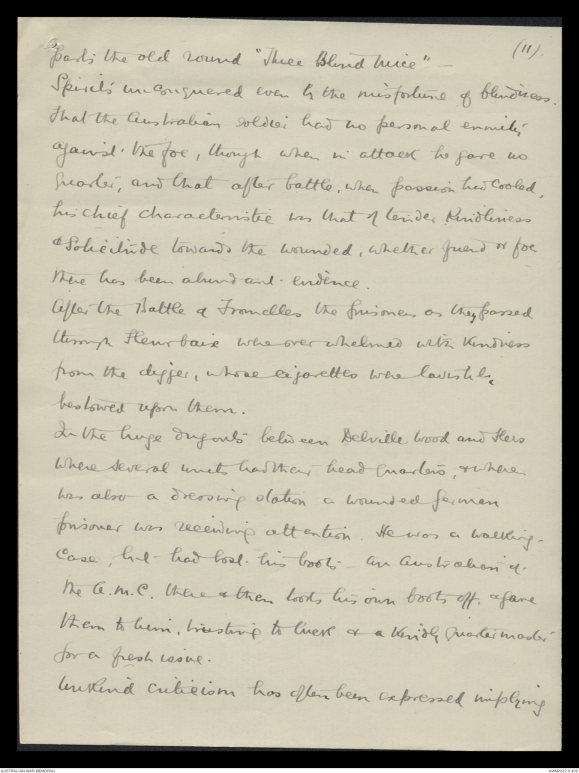
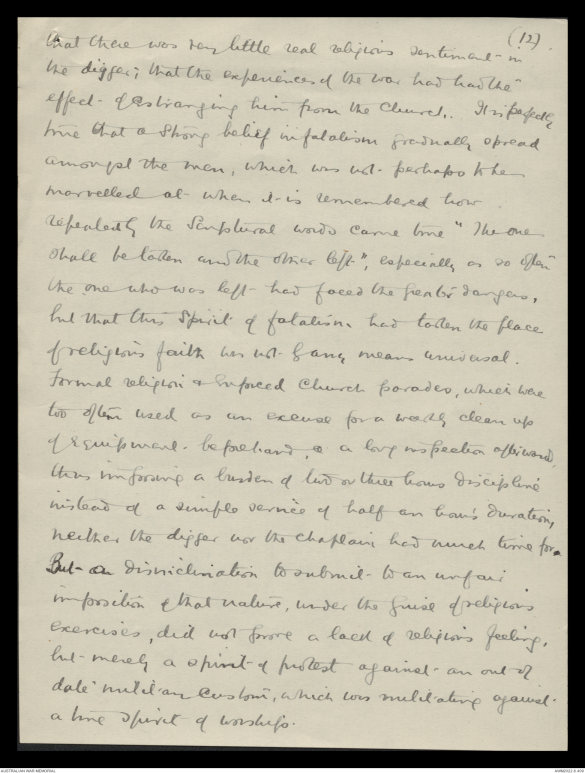
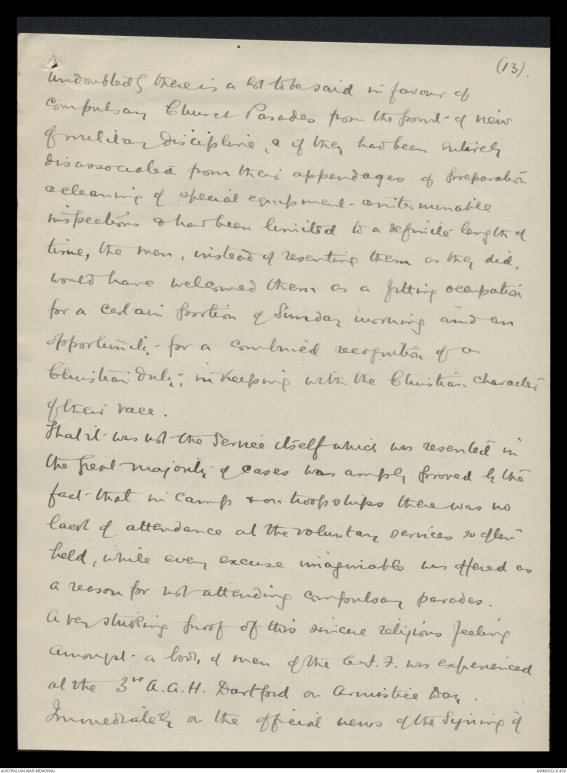
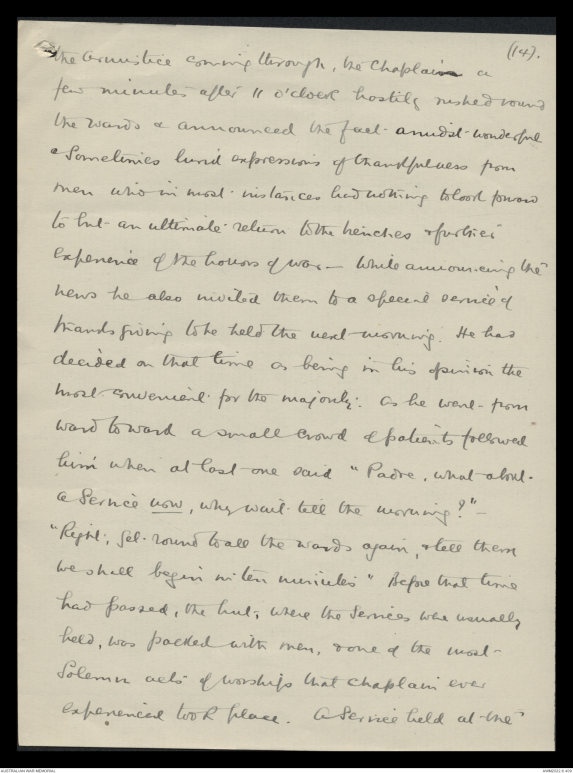
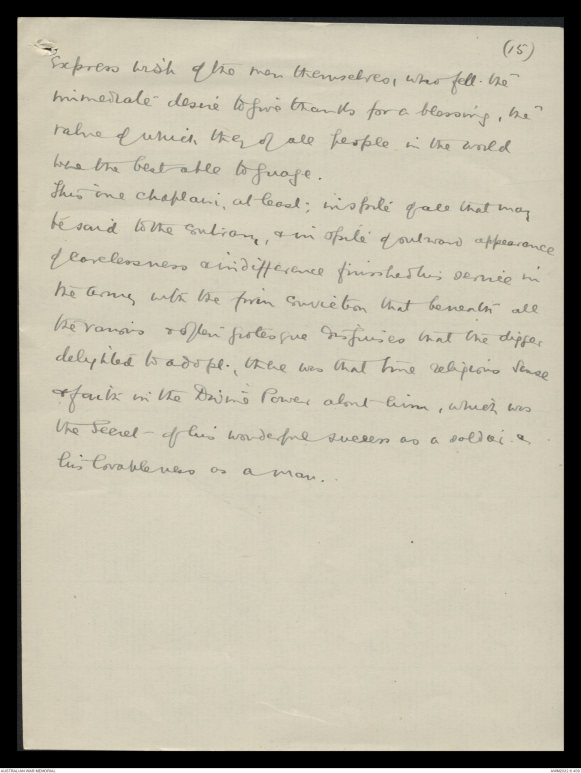
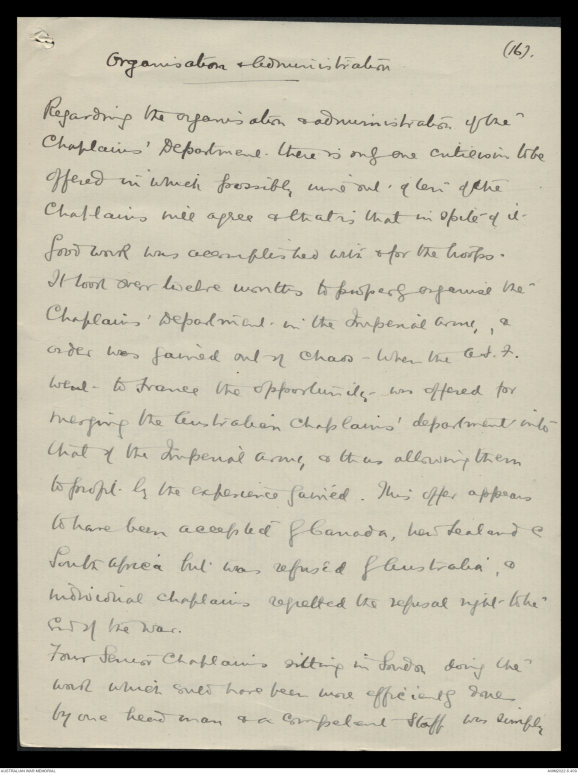
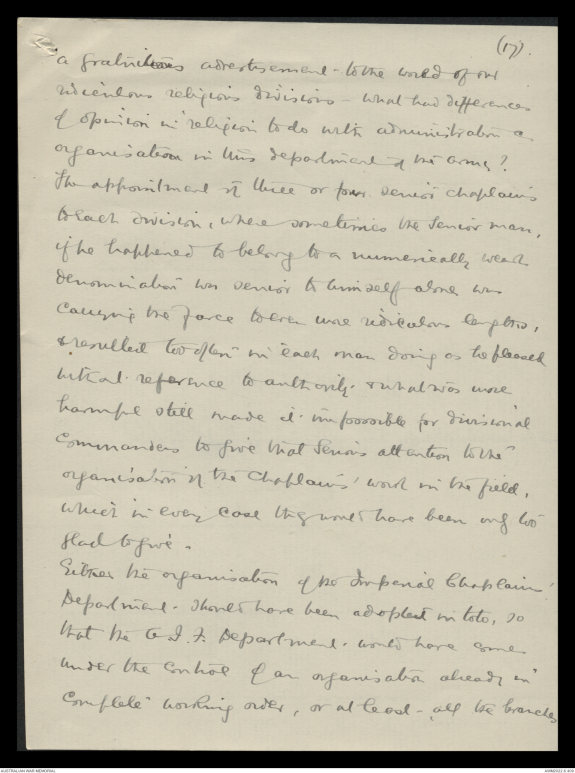
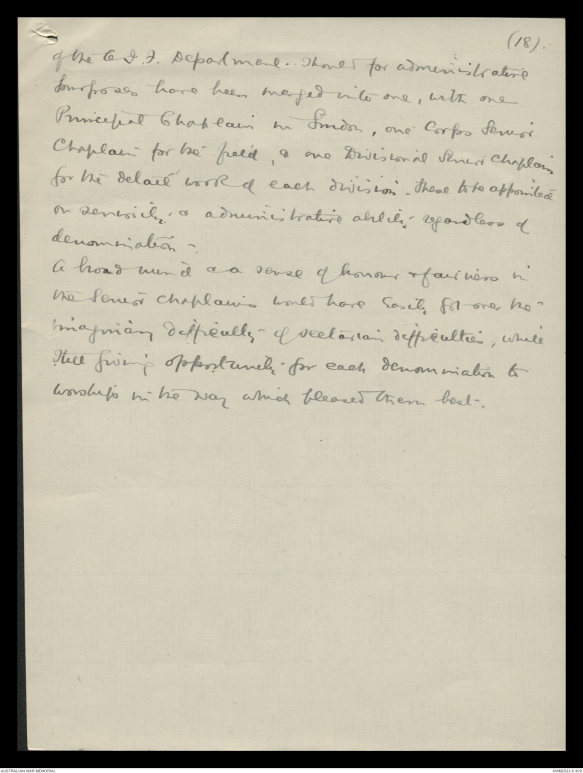
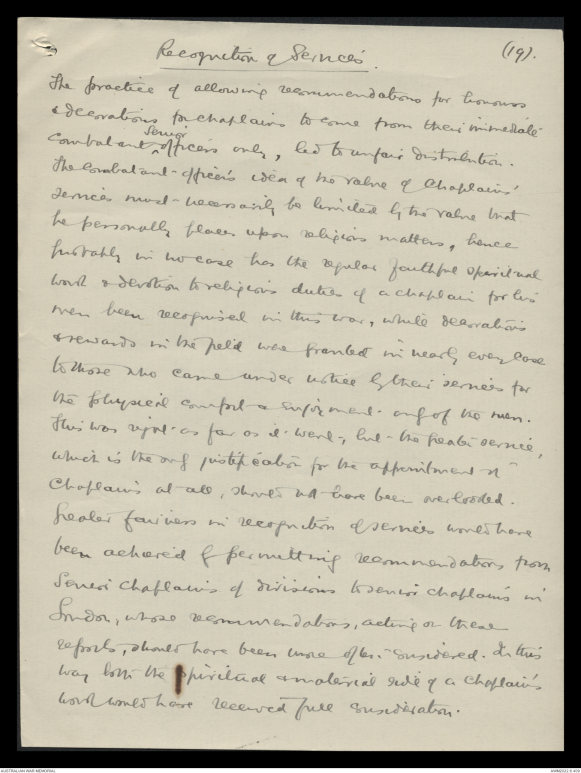
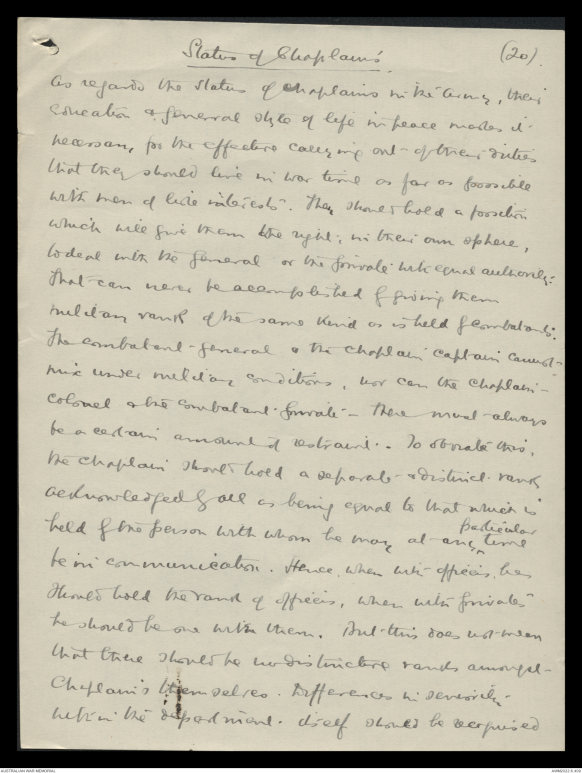
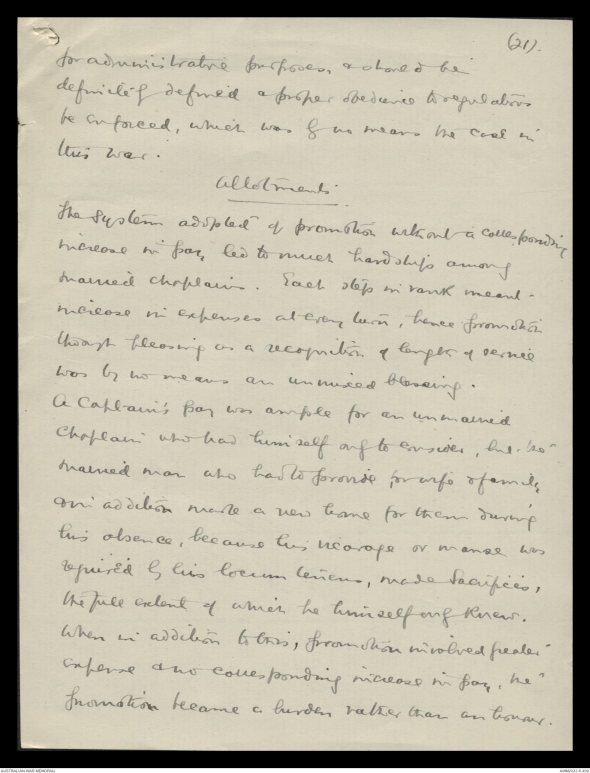
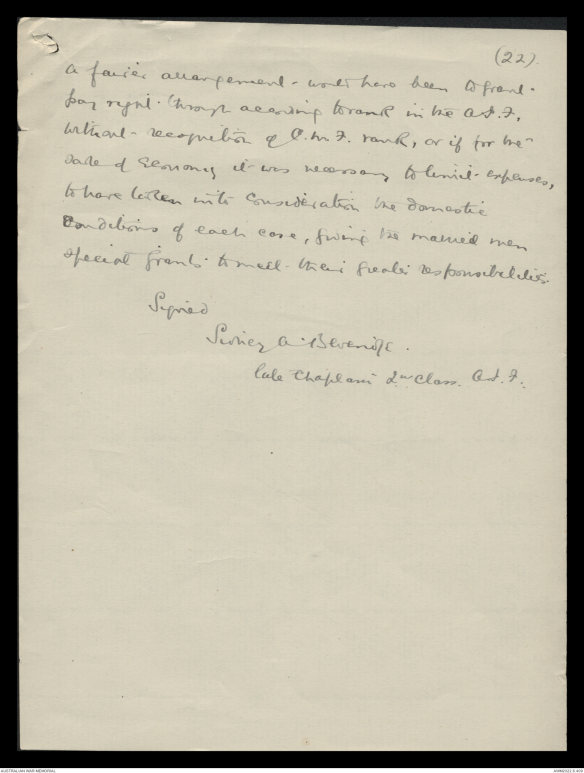
(11).
parts the old round "Three Blind Mice" -
Spirits unconquered even by the misfortune of blindness.
That the Australian soldier had no personal enmity
against the foe, though when in attack he gave no
quarter, and that after battle, when passion had cooled,
his chief characteristic was that of tender Kindliness
& Solicitude towards the wounded, whether friend or foe
there has been abundant evidence.
After the Battle a Fromelles the prisoners as they passed
through Fleurbaix were overwhelmed with kindness
from the digger, whose cigarettes were lavishly
bestowed upon them.
In the huge dugouts between Delville Wood and Flers
where several units had their head quarters, & where
was also a dressing station a wounded German
prisoner was receiving attention. He was a walking -
case, but had lost his boots. An Australian of
the A.M.C. there & then took his own boots off & gave
them to him, trusting to luck & a kindly Quartermaster
for a fresh issue.
Unkind criticism has often been expressed implying
(12)
that there was very little real religious sentiment in
the digger; that the experiences of the war had had the
effect of estranging him from the Church. It is perfectly
true that a strong belief in fatalism gradually spread
amongst the men, which was not perhaps to be
marvelled at when it is remembered how
repeatedly the Scriptural words came true “The one
shall be taken and the other left”, especially as so often”
the one who was left had faced the greater dangers,
but that this spirit of fatalism had taken the place
of religious faith was not by any means universal.
Formal religion & Enforced Church parades, which were
too often used on an excuse for a weekly clean up
of Equipment beforehand, & a long inspection afterward
thus inforcing a burden of two or three hours discipline
instead of a simple service of half an hour's duration,
neither the digger nor the chaplain had much time for.
But a disinclination to submit to an unfair
imposition of that nature, under the guise of religious
exercises, did not prove a lack of religious feeling,
but merely a spirit of protest against an out of
date military custom”, which was militating against
a true spirit of worship.
(13).
Undoubtedly there is a lot to be said in favour of
Compulsary Church Parades from the point of view
of military discipline, & if they had been entirely
disassociated from their appendages of preparation
a cleaning of special equipment interminable
inspections & had been limited to a definite length of
time, the men, instead of resenting them as they did
would have welcomed them as a fitting occupation
for a certain portion of Sunday morning and an
opportunity for a combined recognition of a
Christian duty; in keeping with the Christian character
of their race.
That it was not the service itself which was resented in
the Great majority of cases was amply proved by the
fact that in camp & on troopships there was no
lack of attendance at the voluntary services so often
held, while every excuse imaginable was offered as
a reason for not attending compulsory parades.
A very striking proof of this sincere religious feeling
amongst a body of men of the Cent. F. was experienced
at the 3rd A.G.H. Dartford on Armistice Day.
Immediately on the official news of the Signing of
(14).
the Armistice coming through, the Chaplain a
few minutes after 11 o'clock hastily rushed round
the wards & announced the fact amidst wonderful
& Sometimes lurid expressions of thankfulness from
men who a most instances had nothing to look forward
to but an ultimate return to the trenches & further
experience of the horrors of war - while announcing the
news he also invited them to a special service of
thanksgiving to be held the next morning. He had
decided on that time as being in his opinion the
most convenient for the majority: as he went from
ward to ward a small crowd of patients followed
him when at last one said "Padre, what about
a Service now, why wait till the morning?"
"Right; get round to all the wards again, & tell them
we shall begin in ten minutes" Before that time
had passed, the hut, where the Services were usually
held, was packed with men, & one of the most
Solemn acts of worship that Chaplain ever
experienced took place. A Service held at the
(15)
express wish of the men themselves, who felt the
immediate desire to give thanks for a blessing, the
value of which they of all people in the world
were the best able to guage.
This one chaplain, at least; inspite of all that may
be said to the contrary, & in spite of outward appearance
of carelessness & indifference finished his service in
the army with the firm conviction that beneath all
the various & often grotesque disguises that the digger
delighted to adopt, there was that time religious sense
& faith in the Divine Power about him, which was
the secret of his wonderful success as a soldier &
his lovableness as a man.
(16).
Organisation & Administration
Regarding the organisation & administration of the
Chaplains' Department there is only one criticism to be
offered in which possibly nine out of ten of the
Chaplains will agree & that is that in spite of it
good work was accomplished with & for the troops.
It took over twelve months to properly organise the
Chaplains' Department in the Imperial army, &
order was gained out of chaos - when the C.I.F.
went - to France the opportunity was offered for
merging the Australian Chaplains' department into
that of the Imperial army & thus allowing them
to profit by the experience gained. This offer appears
to have been accepted by Canada, New Zealand &
South Africa but was refused by Australia, &
individual chaplains regretted the refusal right to the
end of the war.
Four Senior Chaplains sitting in London doing the
work which could have been more efficiently done
by one head man & a competent Staff was simply
(17).
a gratuitous advertisement to the world of our
ridiculous religious divisions – what had differences
of opinion in religion to do with administration or
organisation in this department of the army?
The appointment of three or four senior chaplains
to each division, where sometimes the Senior man,
of he happened to belong to a numerically weak
Denomination was senior to himself alone was
carrying the force to even more ridiculous lengths,
& resulted too often in each man doing as he pleased
without reference to authority & what was more
harmful still made it impossible for divisional
Commanders to give that serious attention to the
organisation of the Chaplains' work in the field,
which in every case they would have been only too
glad to give.
Either the organisation of the Imperial Chaplains'
Department should have been adopted in toto, so
that the C.I.F. Department would have come
under the control of an organisation already in
complete working order, or at least all the branches
(18).
of the C.I.F. Department. should for administrative
purposes have been merged into one, with one
Principal Chaplain in London, one Corps Senior
Chaplain for the field, & one Divisional Senior Chaplain
for the detail work of each division. These to be appointed
on seniority & administrative ability, regardless of
denomination
A broad mind & a sense of honour & fairness in
the Senior Chaplain would have easily got over the
imaginary difficulty of sectarian difficulties, while
still giving opportunity for each denomination to
worship in the way which pleased them best.
(19).
Recognition & Services.
The practice of allowing recommendations for honours
& decorations for chaplains to come from their immediate
combatant ^Senior officers only, led to unfair distribution.
The Combatant officer's idea of the value of Chaplains'
services must necessarily be limited by the value that
he personally places upon religious matters, hence
probably in no case has the regular faithful spiritual
work & devotion to religious duties of a chaplain for his
men been recognised in this war, while decorations
& rewards in the field were granted in nearly every case
to those who came under notice by their services for
the physical comfort & enjoyment only of the men.
This was right as far as it went, but the greater service,
which is the only justification for the appointment of
Chaplains at all, should not have been overlooked.
Greater fairness in recognition of services would have
been achieved by permitting recommendations from
Senior Chaplains of Divisions to senior chaplains in
London, whose recommendations, acting or these
reports, should have been more often considered. In this
way both the spiritual & material side of a chaplain's
work would have received full consideration.
(20).
Status of Chaplains.
As regards the status of chaplains in the army, their
education & general style of life in peace makes it
necessary for the effective carrying out of their duties
that they should live in war time as far as possible
with men of like interests. They should hold a position
which will give them the right, in their own sphere,
to deal with the General or the Private with equal authority.
That can never be accomplished by giving them
military rank of the same kind as is held by combatants.
The combatant general & the Chaplain 'Captain' cannot
mix under military conditions, nor can the Chaplain-
Colonel & the combatant Private - there must always
be a certain amount of restraint. To [[?ate]] this,
the chaplain should hold a separate & distinct rank
acknowledged by all as being equal to that which is
held by the person with whom he may at any ^particular time
be in communication. Hence when with officers, he
should hold the rank of officers, when with Privates
he should be one with them. But this does not mean
that there should be no distinctive ranks amongst
Chaplains themselves. Differences in seniority
kept in the department itself should be recognised
(21).
for administrative purposes, & should be
definitely defined & proper obedience to regulations
be enforced, which was by no means the case in
this war.
Allotments.
The system adopted of promotion without a corresponding
increase in pay, led to much hardship among
married chaplains. Each step in rank meant
increase in expenses at every turn, hence promotion
though pleasing as a recognition of length of service
was by no means an unmixed blessing.
A Chaplain's pay was ample for an unmarried
Chaplain who had himself only to consider, but to
married man who had to provide for wife & family
& in addition make a new home for them during
his absence, because his vicarage or manse was
required by his locum tenens, made sacrifices,
the full extent of which he himself only knew.
When in addition to this, promotion involved greater
expense & no corresponding increase in pay, the
promotion became a burden rather than an honour.
(22)
a fairer arrangement would have been to grant
pay right through according to rank in the A.I.F,
without recognition & C.M.F. rank, or if for the
sake of ceremony it was necessary to limit expenses,
to have taken into consideration the domestic
conditions of each case, giving the married men
special grants to meet their greater responsibilities.
Signed
Sidney A. Beveridge
late Chaplain 2nd Class A.I.F.
 Sandy Mudie
Sandy MudieThis transcription item is now locked to you for editing. To release the lock either Save your changes or Cancel.
This lock will be automatically released after 60 minutes of inactivity.